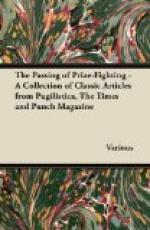It has been already said that the youth of the Jack of all Journalisms is lost in obscurity. It is obvious that he cannot have acquired his readiness of pen without much practice, but where the practice was obtained is a puzzle to which each of his enemies has a different key. Some say of him that he spent a year or two at a University, where he was noted for the unfailing regularity with which he sought the society of the wealthy, imbibed strong drinks, and omitted to pay his debts. It is also alleged that he started a colourable University imitation of the journal which happened at that particular time to be the most highly coloured in London, and that, after struggling through two numbers of convulsive scurrility, the infant effort withered under the frown of the Authorities, who at the same time sent its founder down. Others, however, declare him to have been the offspring of a decayed purveyor of spurious racing intelligence, who naturally sent his son to shift for himself after he had lost his last shirt in betting against one of his own prophecies. Others again aver, and probably with equal accuracy, that he was at no time other than what he is when the world first becomes aware of his existence—the blatant, cringing, insolent, able and disreputable wielder of a pen which draws much of its sting and its profit from the vanities and fears of his fellow-creatures. Be that as it may, he somehow becomes a power. He attaches himself to many journals, the editors of which he first pesters, afterwards serves, and always despises. He may perhaps have dabbled in music, and caused a penniless friend who is musical to write for small pay songs which he honours by attaching his own name to them as their composer. Woe betide the unhappy aspirant to the honours of public singing who ignores the demand of this quasi-musical Turpin that she should sing his songs. For, having become in the meantime a musical critic, he will devote all his talents to the congenial task of abusing her voice in his organ—which is naturally the more powerful instrument of the two. Should she, however, submit to his extortionate requests, he will deem himself entitled to embitter the rest of her existence with his patronising commendation.




